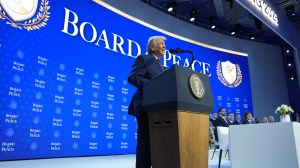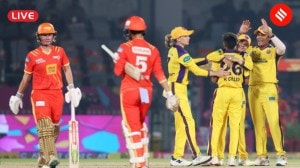It146;s time to call ICC146;s bluff
The International Cricket Council ICC and the Board of Control for Cricket in India BCCI are back to blaming each other for making a mes...

The International Cricket Council ICC and the Board of Control for Cricket in India BCCI are back to blaming each other for making a mess of the contract issue.
Both the bodies knew quite clearly after the firmness displayed by the Indian players in the lead up to the ICC Champions Trophy in September that they were not prepared to relinquish their personal commercial rights. After promising to resolve the matter by end October the ICC has done precisely little.
The issue, which the BCCI and the players have to press, is that rights of individuals have been sold without their knowledge. The BCCI agreed to field its team in the ICC events but not with the conditions that the ICC is now demanding.
It doesn8217;t help by accusing the ICC sponsors of being anti-national if they don8217;t waive off their rights. They were offered the rights, which include the ones being contested by the Indian players, at a premium. If today the ICC or its marketing agents Global Cricket Corporation GCC are not able to fulfill their commitments then the contracts have to be renegotiated.
It is like you go and book a four-bedroom house with a builder for an agreed price and a year later the builder comes back to you and says sorry I can only give you a three-bedroom flat as the civic authorities are not permitting me to build as much as I had offered.
Would you still pay him the agreed price or ask him to reduce it by an equitable amount? Nobody would pay the full amount. So why should the sponsors waive off the conditions without any financial relief from the ICC or GCC. Most of these sponsors have a long-term association with the game in India.
Besides being sponsors of official BCCI run events Pepsi and Hero Honda, specifically, use a lot of Indian cricketers in their advertisements. Pepsi has under contract Saurav Ganguly, Rahul Dravid, Sachin Tendulkar, Harbhajan Singh, VVS Laxman, Zaheer Khan, Yuvraj Singh and Mohammed Kaif. Similarly, Hero Honda has Ganguly, Harbhajan, Virender Sehwag, Zaheer, Yuvraj and Kaif. By no yardstick can they be termed as anti-player. No, not even anti-national.
It would be a bit far fetched to assume that these companies plotted and planned to get these clauses inserted to block out their competitors 8211; read TVS 8211; Tendulkar by Hero Honda and Coke-Sehwag by Pepsi.
On the other hand these people would have been compelled to pay a premium by the ICC/GCC under the threat that with a similar contract their competitors would block them out from using their army of cricketers.
It is funny that you pay the players and then under threat pay extra to the ICC/GCC to continue using these players and eventually be asked to give up these rights to prove your nationalism! Bizarre, isn8217;t it?
The reality is, as the players and the BCCI have pointed out, that the ICC has gone and sold the individual rights of the players over which the latter had no right. The standard practice globally for all international sports events is that the players/teams have to respect the rights of the sponsors once inside the stadium.
For instance they cannot sport a logo of a competitor of the official sponsor. In most sports even this is not enforced any longer. Of course, you cannot deride the official sponsors or appear in commercials in national colours. Players can do what they want in their individual capacity but not as a representative of the national team.
Of course, some would still argue that these cricketers have become famous because they play for India. What they would choose to ignore is that first these players became good enough for India. Such people wouldn8217;t be happy till Tendulkar saluted them every morning or went around town in a jaunty jalopy.
These are people who have failed to attain fame and money like these cricket stars but have fooled themselves into believing that all these worldly pleasures were given up them in their holistic pursuits. Rubbish.
Most of these people would grab the first buck they can lay their hand on. Only the official sponsors can place their signage around the turf where the battles are contested. They form the backdrop to historic moments and that is the reason they pay a hefty price.
Their competitors or others don8217;t become part of the action or either history by running spots on television during breaks when in any case people are running to the loo to relieve themselves or the refrigerator to grab a snack. Further they get the right to usage of official logos and marks and run promotions right inside the stadia. The ICC is demanding that the BCCI force its players to accept the conditions imposed by it. Were the BCCI to do this then it would tantamount to inducing its players to breach their existing contracts and also give up their rightful means of earnings.
The ICC Chief Executive, Malcolm Speed has made a very ominous statement. 8220;The reality is that any person or organisation that fails to live up to its commitments risk claims for compensation being made against it and the BCCI is no different.8221; That is all very fine but surely this applies to the ICC also for making false commitments to its sponsors.
Already the ICC has diluted their rights somewhat. Mr Speed would also do well to explain if he considers selling off rights, which did not belong to ICC, as justified or illegal. Common sense suggests it would be illegal and on that ground both the BCCI and the players can also claim compensation.
But this is the time to leave the legalese aside. Nothing would be achieved by mud slinging. ICC must realize that it has over sold. To be honest they do but would not admit. Otherwise why have all member boards, BCCI not included, quickly accepted player demands to share 25 per cent of their revenue from ICC events?
You offer compensation only when you have faulted. Or do we assume that the ICC has very cleverly inserted this clause to gain popularity with a majority of boards by fattening their coffers with money shipped from the Indian market. Even all international players, including FICA which represents most international players, are very happy with this windfall.
No international players have any substantial endorsements and these restrictions in any case never affected their lives. But on the pretext of accepting these conditions all non-Indian cricketers have benefited substantially. Whilst the ICC and other boards have cleverly benefited by scratching each others back and here we are debating why should our players earn so much or simply why can8217;t they give up their contracts to just play for the love and honour of representing the country.
Another cross section is busy examining conspiracies behind the decision of corporates, Indian and India-centric MNCs as far as cricket goes, to take up the sponsorship of ICC events.
Why can8217;t people here just stop running down players, sponsors and BCCI and instead sit up and realize that the ICC in collusion with a majority of boards and their players have taken entire Indian cricket for a ride. The moment everybody here unites ICC will back off in less than a minute.
- 01
- 02
- 03
- 04
- 05































